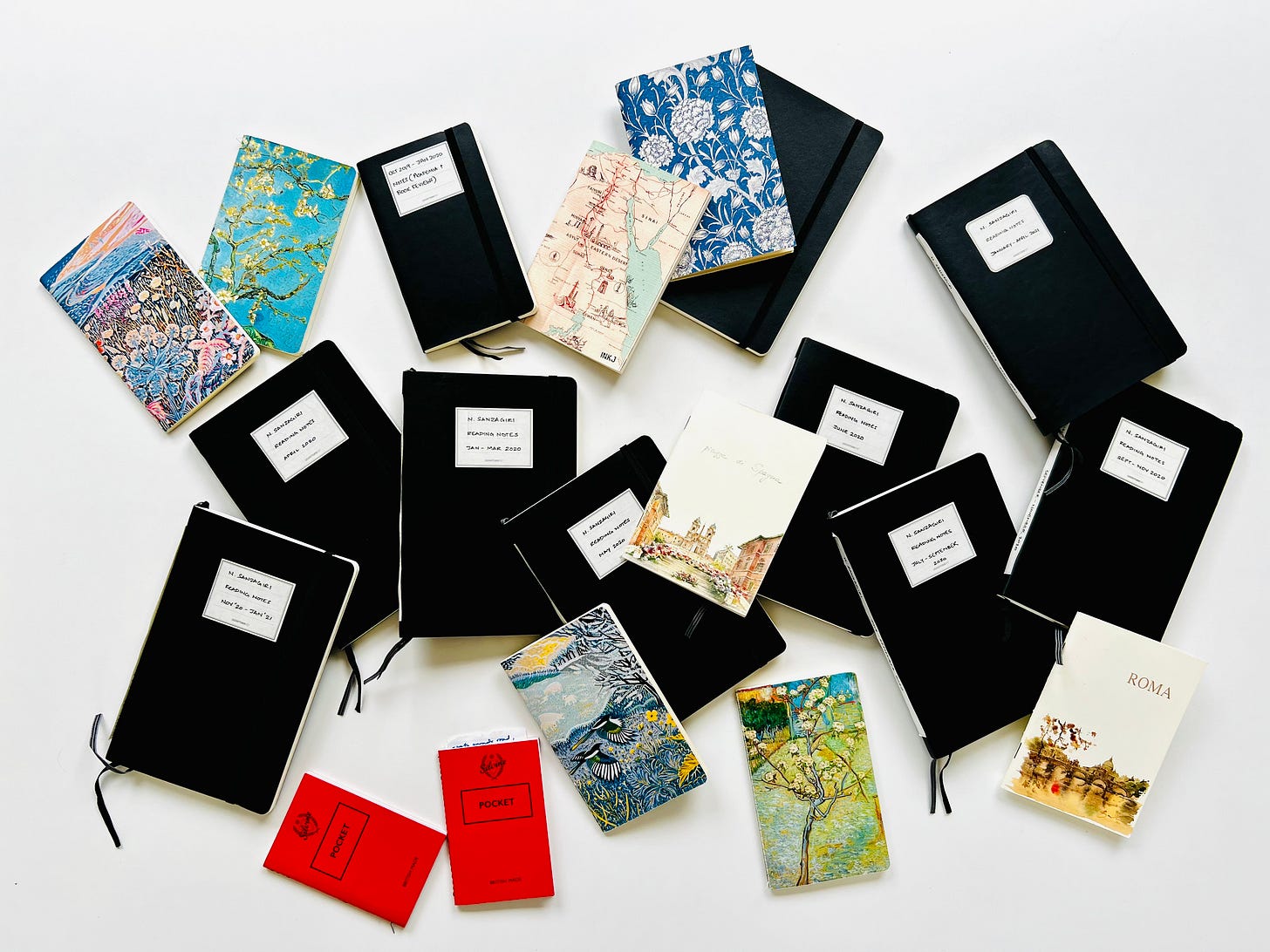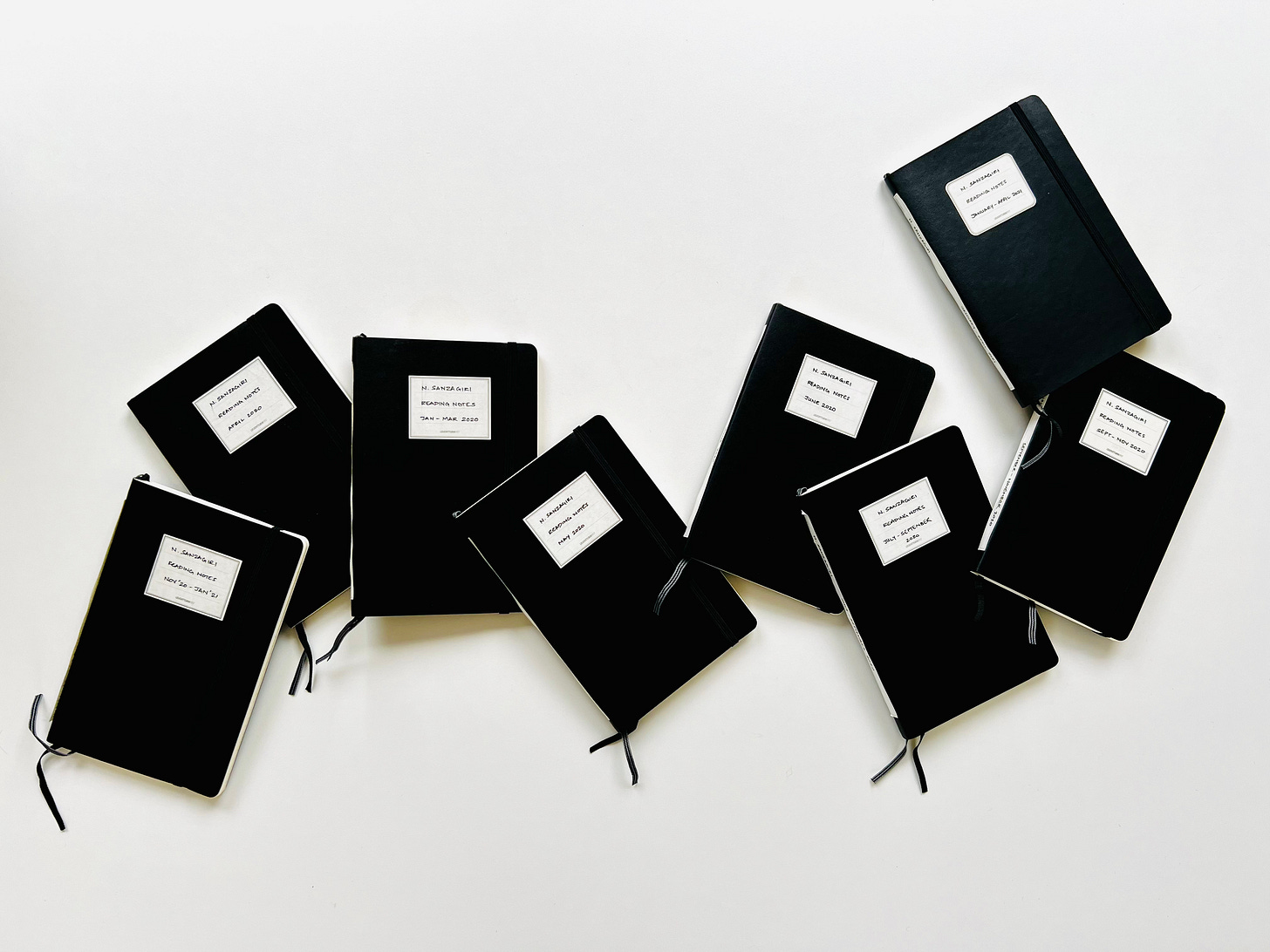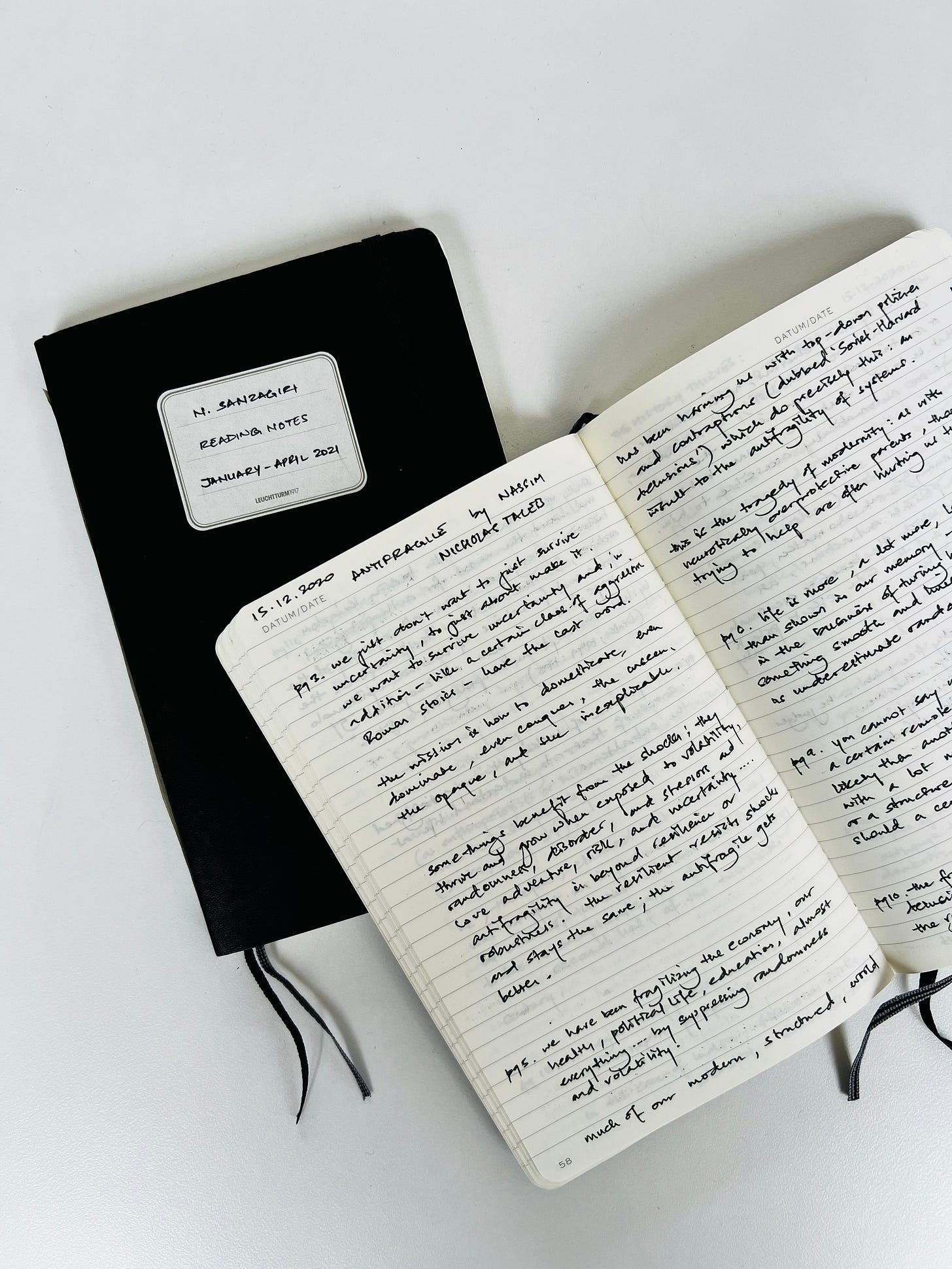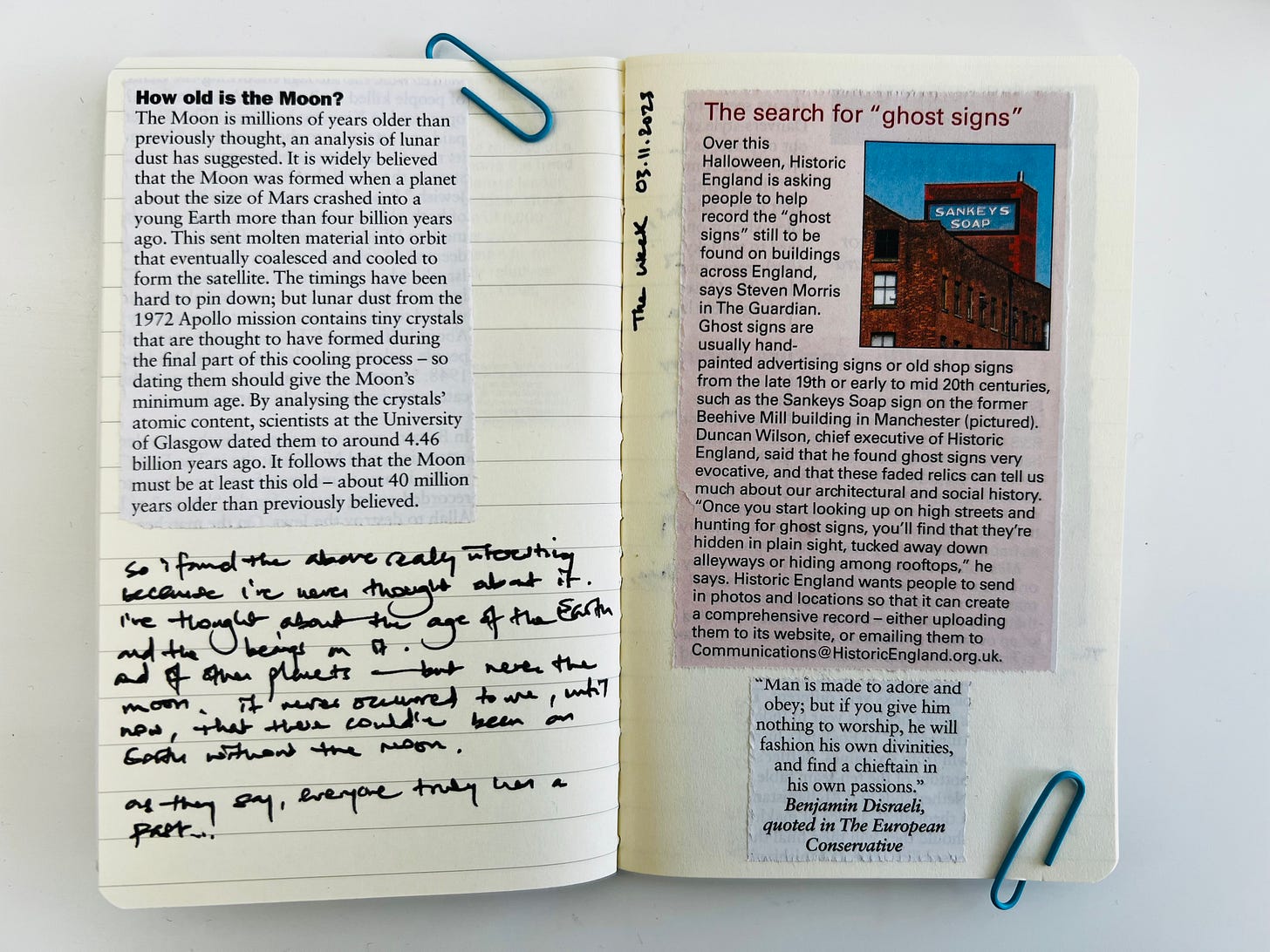Happy Wednesday, all!
Recently, one of my favourite authors on Substack,
, penned an insightful piece about the different ways of diary-keeping, which made me think of my own journey with notetaking. So, I dug out some of my notebooks from the last couple of years, and today’s reflection is a sneak peek into them.
Handpicked Reads
Josephine Quinn’s essay in the Financial Times challenges the conventional understanding of ‘civilization’, arguing that the notion of distinct, isolated civilizations is a modern construct. She emphasizes the interconnectedness of cultures throughout history, contrary to the idea of civilizations being a “zero-sum game, with higher cultures under threat from migrant, fecund foreign values.” Quinn critiques the oversimplified view of Western culture as a linear progression from the classical world, highlighting the diverse influences that shaped it, quipping: “No single people is an island, unless they’ve been there for a very long time and haven’t invented boats.”
The Indian police have released a pigeon they detained last year on suspicion of being a Chinese spy. The suspected avian was captured in Mumbai with what appeared like messages written in Chinese lettering under its wings and a copper and aluminium ring. After eight months of investigations, however, it was revealed that it was a racing bird from Taiwan that had taken a wrong turn.
(Not-So) In-Depth Reflections

My notebooks and I
In the quiet but messy sanctuary of my study, surrounded by a tower of notebooks, some with their meticulously labeled spines and others with their ornate covers, I am reminded of Walter Stephens’ conception of humans as Homo scribens — Man the Writer. Writing, he argues, “is the one accomplishment we do not share with Neanderthals and our other ancestors” — imagine a world devoid of writing, he proposes:
No pencils, no pens, no paper, no grocery lists. No chalkboards, typewriters or printing presses, no letters or books. No computers or word processors, no email or internet, no social media; and without binary code — strings of ones and zeroes that create computer programs — no viewable archives, no film or television either.
I wholeheartedly agree. Our distinction lies not merely in being social creatures who communicate, but in our ability to write and to etch our thoughts across time and space. In a way, we are the only species that can already time travel, with writing being our medium to achieve that — zooming from the past and into the future, be that via carvings in caves, markings on paper, or etchings on silicon.
From a young age, I’ve found refuge in writing, and the COVID-19 lockdowns nudged me back towards the tangible world of handwritten words, after a brief, academic interlude where my MacBook was the medium of choice.
What began as a collection of carefully captured verbatim quotes from books I read has evolved into a personal framework of its own. At any given time, I juggle multiple notebooks: a pocket notebook for spontaneous thoughts, a private journal for intimate reflections, and another for quotes and newspaper clippings. Part academic, but mostly aesthetic.

It’s been said before that “most writers are stationary fetishists” — when it comes to me, that could not be more of an understatement. Initially, I hesitated to mar my books with personal notes, fearing I had little of value to add — I worried that scribbling my own inferior thoughts would dilute what the author was trying to say. And it’s hard to fetishize a notebook that’s marred by something, like your own thoughts and handwriting, you don’t yet like, right? I hadn’t yet awoken to the fact that I myself could be — sorry, I am and always have been — a writer.
Fast-forward two years, and during a personally challenging period in January 2022, I embraced journaling and discovered that my thoughts, feelings, and emotions were indeed worthy of the paper I was writing them on.
It was the act of journaling that awakened me to embrace the beauty in my unfiltered, raw thoughts. This acceptance led to a profound shift, and like Valeria in Alba De Cespedes’ Forbidden Notebook, I began to see the significance in the hitherto inconsequential:
Now under everything I do and say, there’s the presence of this notebook. I never would have believed that everything that happens to me in the course of a day would be worth writing down. My life always appeared rather insignificant, without remarkable events.
My moods began to ebb and flow with remarkable unpredictability. It’s a truth universally acknowledged by those who journal —and here, I must confess my survey extends to a grand sample size of one — that every journal entry oscillates between the poles of supreme joy, gratitude, and self-love, or steeped in sadness and melancholy.
Over time, the deeper I went into the labyrinth of self-scrutiny, the more I noticed my love-hate relationship with journaling. There were months I stayed away from noting down anything personal. Again, channeling my inner Valeria, I’d say:
I know that my reactions to the facts I write down in detail lead me to know myself more intimately every day … [but] the better I know myself, the more lost I become. Besides, I don’t know what feelings could stand up to a ruthless, continuous analysis; or who among us, reflected in every action, could be satisfied with ourselves.
This brings me to now. Since starting this newsletter I’ve taken inspiration from that great notetaker of Renaissance Italy, Leonardo Da Vinci, who advised his fellow artists to “take a note … with slight strokes in a little book that you should always carry with you … preserved with great care.” And so, I carry a little pocket notebook where I capture the serendipitous inklings (hence the name) and fleeting interactions.

Over the years, my notebooks have come to mean more to me than I could have ever anticipated— they are a sanctuary of past memories and the seedlings of future adventures. They serve as dialogues with my inner self and an extension of my life experiences. Yet, it’s not without its paradoxes — there are times I catch myself believing that if a moment isn’t captured in writing, it somehow loses its authenticity. It’s an analog version of the digital validation so many of us crave on social media: If your holiday pictures don’t make their way to your Instagram feed, did it truly happen? Similarly, if a thought didn’t find its way into one of my notebooks, was it really worth having?




Your notebooks are so wonderful! Thanks so much for sharing!